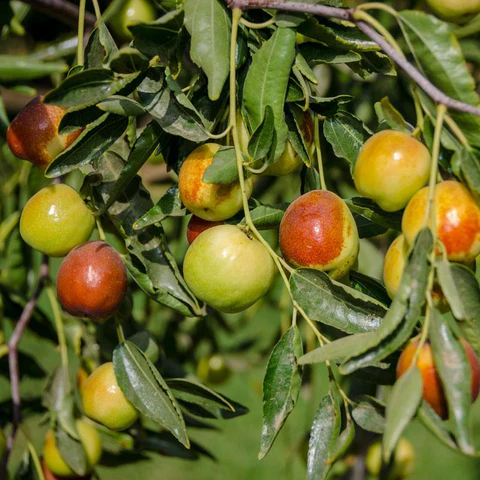Žižole If you’ve never heard of žižole, don’t worry—you’re not alone. Also known as jujube, this underappreciated fruit has quietly been making waves in health circles. Originating from parts of Asia and the Mediterranean, žižole looks like a small date or olive and has a sweet, apple-like taste when fresh. Once dried, it transforms into something more akin to a date—chewy, sugary, and deeply flavorful.
The name “žižole” is commonly used in some European countries, particularly in the Balkans and Mediterranean regions. Regardless of what you call it—jujube, red date, or Chinese date—this fruit is a powerhouse of nutrition, medicinal properties, and culinary versatility.
Žižole have been cultivated for over 4,000 years. They are mentioned in ancient Chinese texts for their healing properties and were widely used in Ayurvedic medicine as well. This is not just another “superfruit” trend; žižole has truly stood the test of time, blending flavor with functionality in the most delicious way.
Nutritional Profile of Žižole
Don’t let its size fool you—žižole packs a serious nutritional punch. A typical serving of jujube (about 100 grams) contains:
-
Calories: ~79
-
Carbohydrates: ~20g
-
Dietary Fiber: ~6g
-
Vitamin C: Over 50% of the daily recommended intake
-
Potassium: Helps regulate blood pressure
-
Antioxidants: Flavonoids, saponins, and polysaccharides
Compared to apples or dates, žižole contains more Vitamin C and significantly higher antioxidant levels. These antioxidants are crucial in fighting free radicals and slowing down aging processes in the body. Plus, the low calorie count and high fiber make it a great snack for those trying to watch their weight.
Žižole are also rich in essential amino acids and minerals such as magnesium, calcium, and iron—making them a well-rounded addition to any diet. Unlike processed snacks, žižole nourish you while satisfying your sweet tooth naturally.
Health Benefits of Žižole
Boosts Immunity
One of the standout features of žižole is its exceptional Vitamin C content. Just a handful of these fruits can drastically improve your immune response. Vitamin C is crucial in the production of white blood cells, which are responsible for defending the body against infectious agents.
Moreover, the antioxidants in žižole help in reducing oxidative stress, which is often linked to weakened immunity. Regular consumption, especially during flu season, can help your body stay resilient against viruses and bacteria. It’s no wonder that in traditional medicine, žižole tea was often prescribed for coughs, colds, and even bronchitis.
A study published in Phytotherapy Research confirmed that jujube extract enhances immune function, increases lymphocyte activity, and improves immune modulation. So if you’re looking for a natural immunity booster, žižole should be your go-to.
Improves Sleep Quality
Ever heard of eating fruit to fall asleep faster? Žižole contains saponins and flavonoids that interact with your brain’s neurotransmitters—especially GABA, which helps you relax and drift into deeper sleep.
In Traditional Chinese Medicine, jujube has been used for centuries as a remedy for insomnia. People would boil it into a tea or mix it with other calming herbs like chamomile or valerian root. The compounds in žižole have a sedative effect, reducing anxiety levels and promoting calmness.
Studies show that jujube extract can prolong sleep duration and reduce interruptions in sleep cycles. If you’re battling with restlessness or occasional insomnia, try adding a few žižole to your nighttime routine. It’s a lot more natural than popping sleeping pills.
Supports Digestive Health
Digestion woes? Žižole can help there too. Thanks to its high fiber content, this fruit aids in smooth bowel movements and prevents constipation. Fiber adds bulk to your stool and supports the growth of good bacteria in your gut, making it a great prebiotic.
Additionally, žižole contains saponins and polysaccharides that improve intestinal health by healing the mucosal lining and fighting off harmful microbes. Whether you have IBS or just a sensitive stomach, incorporating žižole into your diet can bring some much-needed relief.
Some people also use žižole tea as a natural remedy for bloating, indigestion, and mild stomach cramps. It’s a gentle, tasty way to care for your digestive system without relying on over-the-counter meds.
Enhances Skin Health
Want glowing skin without breaking the bank? Žižole has got you covered. Its antioxidant-rich profile protects your skin from oxidative damage, which can lead to premature aging, wrinkles, and dullness. Plus, the Vitamin C content helps in collagen production, keeping your skin firm and youthful.
Regular consumption of žižole can help reduce acne, improve elasticity, and even out your skin tone. Some skincare products even incorporate jujube extract for its anti-aging benefits.
There’s also evidence that jujube’s anti-inflammatory properties can help with chronic skin conditions like eczema or psoriasis. So whether you’re eating them or applying them topically, žižole can be a beauty booster inside and out.
Manages Stress and Anxiety
Stress is something we all deal with, but what if a small fruit could help you manage it better? Žižole’s adaptogenic properties allow it to support your adrenal glands, which are responsible for regulating stress hormones like cortisol.
By balancing these hormones and promoting a sense of calm, žižole can reduce anxiety levels and improve overall emotional well-being. In traditional practices, the fruit was often brewed in calming teas and used during meditation or prayer.
Modern research backs this up. Several animal studies show that jujube extract has anxiolytic effects—meaning it helps relieve anxiety. If you’re going through a stressful time, consider munching on a few žižole or sipping some žižole tea in the evening.
